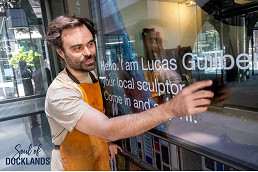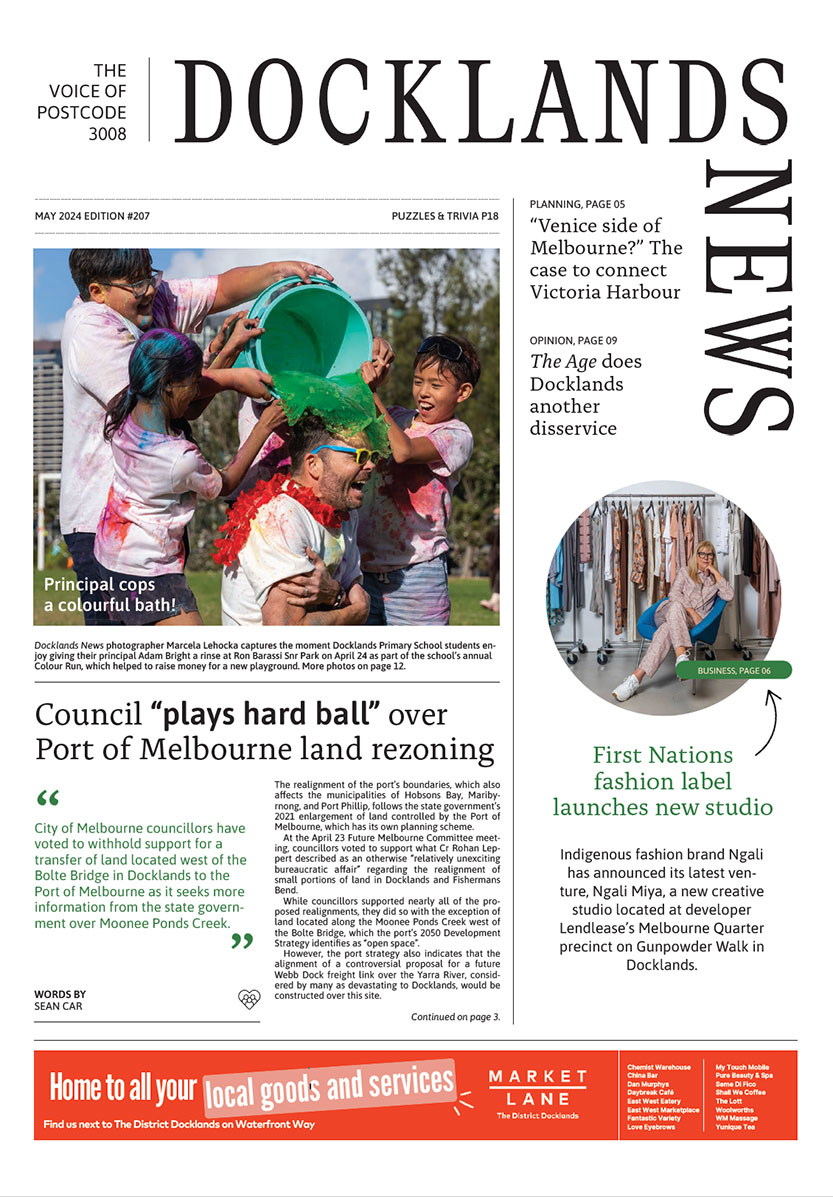The Age does Docklands another disservice
“Lifeless concrete jungle or vibrant suburb?” was the proposition posed by journalists at The Age as part of a series it published in April diving into “what has gone wrong” with Docklands, and “what could be done to fix it”.
Word had got around in recent months that the masthead was preparing such a series, and when one if its journos attended the March 19 launch of Soul of Docklands – a campaign celebrating our suburb – some were optimistic about what was coming.
But if anyone held renewed confidence that The Age was going to move away from its habit of regurgitating negative perceptions about Docklands, those hopes were extinguished on April 12 when it released a string of tepid articles.
Under a hero umbrella story titled, “This suburb is often called a lifeless concrete jungle. Here’s how it can flourish”, it ran a further five articles unpacking various problems with Docklands, while offering few, if any, meaningful solutions.
While the journalist’s attendance to the Soul of Docklands launch had fuelled belief among some that a refreshingly constructive piece might be looming, upon reading its lead story, it’s as if they weren’t even there.
The piece goes as far as referencing comments made by Docklands Chamber of Commerce president Daniel Hibberd on the day of the launch, without mentioning the context in which they were made.
“Standing in front of floor-to-ceiling windows overlooking the waterfront with the sunlight glistening off the water, Daniel Hibberd says he is fed up with hearing complaints about the suburb,” The Age article read.
To find any reference to Soul of Docklands, one has to go to the fourth story in the series about “How the Melbourne Star stopped shining”, where it quotes resident Anikesh Sasmal, one of those interviewed as part of the campaign.
The Age wrote: “‘What people think is, Docklands is dead because the wheel is dead,’ Docklands resident Anikesh Sasmal told a recent launch of Soul of Docklands, a community-based project aimed at rehabilitating the image of the suburb by focusing on its residents.”
Whether The Age chose to emphasise the campaign in its editorial coverage or not is somewhat irrelevant, but the manner in which it almost completely ignored it all together goes some way to revealing its overall approach.
Despite sending one of several journalists it deployed to contribute to the series to the campaign launch, it would appear its intentions were always to revisit household Docklands’ problems (wind, The Wheel, etc.) as opposed to anything granular.
No-one is under any false illusions that Docklands isn’t devoid of issues, isn’t a victim of some poor planning decisions, and isn’t prone to wind. As Daniel Hibberd said, we’ve heard it all before.
And, of course, one can’t ignore history either. Like anything, those responsible for Docklands and who are invested in its community, must learn from its past in order to write the suburb’s next chapter.
But thanks to many in the mainstream media, Melburnians are very, very familiar with the fact that Docklands isn’t perfect by now. This isn’t news. And as Melburnians, we should want to see Docklands, which part of Melbourne, thrive. Or as The Age says, “flourish,” right?
So, according to the series, “what could be done to fix it”?
A new high school at the Costco site, redeveloping Central Pier, the AFL’s plans for Marvel Stadium and removal of The Wheel are among the big visions explored – none of it new, and all previously covered, including by Docklands News.
Despite six articles by four different journalists, the only thing close to a new idea is offered by the random voice of Libertarian MP David Limbrick to convert Docklands into Melbourne’s Silicon Valley by scrapping some taxes for businesses.
And finally, there is an entire article dedicated to the area’s wind tunnel effect, where a wind expert offers his insights on what could be done to fix it. Seriously? For all the resources invested, is this really the best it could do for Docklands?
For all the focus on it, wind is far from the area’s biggest issue. Some more pressing concerns holding Docklands back include the bureaucratic paralysis caused by Development Victoria and the City of Melbourne’s joint governance arrangements, the Port of Melbourne’s plans to build a freight bridge across the harbour and ongoing delays to revitalise Harbour Esplanade, to name just a few – none of which made it into The Age’s analysis.
It failed to even mention the council’s 2022 Docklands Summit, which produced a range of short-, medium- and long-term actions that seek to address many of the issues raised.
Ultimately, all that the series achieves is reinforcing negative feelings people who don’t live or work in Docklands already feel towards it. This fate was sealed in its opening proposition: “lifeless” or “vibrant”? The rest was history.
For an area where there was no life 25 years ago, it certainly isn’t “lifeless” anymore. In the context of other global urban renewal projects, it’s come a very long way in a short space of time – a fact often forgotten.
And, like any work in progress, there is still some way to go in the journey of Docklands realising its full potential. This should only be cause for optimism rather than further negativity, which doesn’t serve the area’s aspirations at all.
University of Melbourne urban planning expert and Docklands resident Dr Elek Pakfa perhaps surmised it best: “I’ve been finding The Age reporting on urban design and planning issues relatively weak, and it has only got worse.”
The general narrative is summed up by perhaps one of the more pointless polls you’ll see, where readers are asked whether Docklands was “a good place to live and visit?” The overwhelming majority, none of whom you’d imagine live or have spent any meaningful time in Docklands, said “no”.
The Docklands community, made up of those who do live and work here, love it. This fact is central to Soul of Docklands, which sought to help outsiders understand its true character by allowing Docklanders themselves to tell that story.
But despite the best efforts of those behind the campaign, this is something that The Age largely chose to overlook. Given its audience, the direction it took in this series was crucial for helping better inform a more robust discussion about the future of Docklands – talk about a missed opportunity. •

Council “plays hard ball” over Port of Melbourne land rezoning





 Download the Latest Edition
Download the Latest Edition
